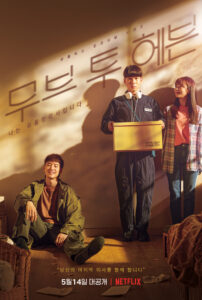
It’s been said that one’s man trash is another man’s treasure, but for Han Geu-ru (Tang Joon-sang), the lead character of Netflix’s latest original K-drama series Move to Heaven, a variation of the saying is more apt: one man’s trash is also his treasure.
This is more or less the philosophy he and his father Han Jeong-u (Ji Jin-hee) employ as the initial duo behind Move to Heaven, a company that specializes in cleaning up after those who have passed away. But as their moniker “trauma cleaners” suggests, they do more than just scrub blood off walls and deodorize rooms from the stench of death. Move to Heaven’s unique service is that they collect their clients’ important belongings—anything, from kept wrappers to framed photos, can be deemed essential—and piece them together to map out and bring some closure to the life of the departed.
It’s a task usually relegated to friends and family, but for those without loved ones, Move to Heaven is a pretty close alternative. They go so far as to attend their clients’ funerals and track down long-lost relatives, all the while carrying their belongings, which they insist says all you need to know about a person. “You just have to be willing enough to listen,” Geu-ru claims.

It’s no coincidence, then, that most of the people they help “move to heaven” are from marginalized sectors, the sort of people society would rather forget. This includes low-wage workers, the sick and elderly, abuse victims, and members of the LGBT community. Geu-ru himself is afflicted with Asperger’s Syndrome, while Jeong-u and his brother Cho San-gu (Lee Je-hoon), who joins the team after Jeong-u’s passing, come from a broken and abusive family. They know firsthand what it’s like to be overlooked, so they see to it that those who also have less in life are redeemed, at the very least, in death.
This moving display of solidarity, along with their belief in the significance of little things, is why Move to Heaven works so well. It puts the stories of the disenfranchised front and center, making sure to balance tragedy with hope and sincerity. It also deftly relates these stories to the main characters’ own experiences so that each episode, despite featuring different people and subject matters, always feels connected to a whole.
The result is a grounded and enduring tale about life, death, and everything in between. Coupled with brilliantly subdued acting and dialogue reminiscent of indie films, Move to Heaven is an absolute must-watch, a tearjerker of a show that puts both characters and audiences in a constant state of suspense, sympathy, and release.
Like most bizarre premises, Move to Heaven is based on true events. Kim Sae-byul is the real-life trauma cleaner whom the show takes its cue from, and in an interview with Netflix, he explained why he was compelled to do more than just the usual cleanup.
People would say, “Someone is dead in our house. There’s a body. What happens to the body? It will smell, the body will rot.” They care about those things, but never about “Who lived in our town?” or “Who lived under the same roof?” Many people are not aware of this part of death.
Almost every episode of Move to Heaven is dedicated to answering those last two questions, with a particular focus on the people we tend to dismiss, if not forget entirely. And it does so through a strange but interesting method: by examining the things they leave behind and assembling them (“like a puzzle”) to construct a poignant and accurate account of their lives.
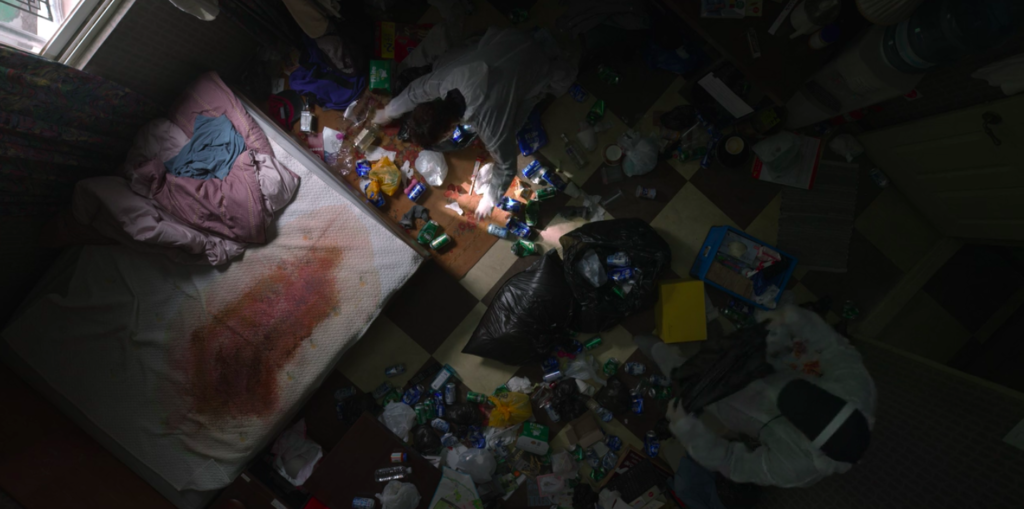
We first see this demonstrated in episode one, when Move to Heaven is called to clean the miniscule quarters of the late Kim Seon-u (Hong Jin-gi), a young factory worker who dies from a work-related injury. Geu-ru notices an abundance of cup noodles, gimbap receipts, and fabric refreshers in his room, then proceeds to declare that Seon-u was the type of guy who was fond of convenience store food and had a sensitivity to smells. “Am I wrong?” he asks his father.
“No, you’re not wrong,” Jeong-u says, but he expounds on Geu-ru’s interpretation and explains that the noodles were chosen more for convenience than taste since Seon-u had very little time to eat. He likewise didn’t care much for gimbap, except when they were on sale. As for the fabric refresher, he brought them along with a pair of underwear and nail clippers in his bag, “So I assume he’s a very neat young man,” Jeong-u says with a sad smile.
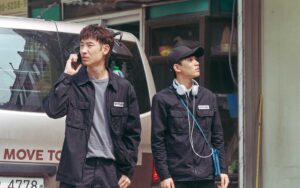
This emphasis on the seemingly trivial is repeated with each new case, and not only does it paint a deeper and more humane picture of the deceased, but it also proves to be quite useful in bringing them the peace and closure they otherwise would never have.
Seon-u’s salvaged phone, for example, brings his mother to tears and empowers her to speak up against the abuses of his son’s company. In different episodes, a user manual becomes a piece of damning evidence that puts behind bars the deceased’s abuser, a flyer helps Geu-ru deliver a heartfelt letter to a forbidden lover, and an unopened piece of clothing from 1988 melts the hardened heart of a prodigal son.
The people they help out may have led troubled lives (the show doesn’t sugarcoat their dire circumstances) but they find peace, somehow, in this sincere, albeit belated, expression of humanity.
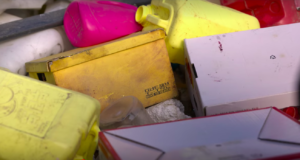
These acts of kindness also enlighten the people surrounding them, not least of which the main characters themselves. In an oddly effective move, Move to Heaven places its leads in the back seat, often revealing bits about their story and character in conjunction with the cases they deal with. In other words, we only learn more about them by how they react to the dead.
When, for example, they take on the case of the closeted doctor Jung Soo-hyun (Kwon Soo-hyun), Geu-ru admits that he is “confused” as to why Soo-hyun’s parents were ashamed of his sexuality. “Isn’t it more shameful to be incapable of love?” he asks his uncle frankly. San-gu explains that some parents disown their kids once they turn out to be different, like “how your dad was sick of you” he tells Geu-ru, to which Gue-ru’s responds:
That’s not true…when kids teased me when I didn’t talk, or when I couldn’t go to school because I talked too much in class, he always told me not to worry. He told me I was just different, not wrong, that he wasn’t ashamed because I did nothing wrong.
Soon after, Geu-ru quietly leaves the room as San-gu stares in stunned silence.
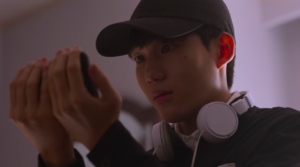
This understated exchange does many things all at once. It hints at the absurdity of homophobia and ableism. It teaches San-gu about the tenderness of his nephew and the kindness of his brother, both of whom he had doubted up until then. And the open-endedness of the whole thing makes Geu-ru realize the limits of his own problem-solving skills. No matter how much he wants to control a situation, there are some issues, like his father’s passing, that are out of his hands. Eventually, he learns to let go.
Most, if not all, episodes play out this way. The complex and gripping stories of the victims are first introduced, then in the process of helping them find closure, the main characters learn more about themselves and the world they live in. Things are not taken part by part but always as a balanced whole. In this way, the show feels less like a serial and more like an extended film.
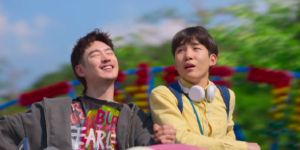
This filmic quality is also present in the subtleness of the actors’ expressions and movements, especially Tang Joon-sang, who is the clear standout in this ensemble. Though his character requires him to be stoic throughout, Tang still finds ways to project palpable emotion, be it in a slight waver of the voice or a panicked dart of the eyes. Of course, each episode is emotionally compelling, but because of Tang’s taut and deft depiction, his scenes are also some of the show’s heartbreaking best.
All in all, Move to Heaven is a nice, quiet entry in the K-drama sphere. By being both critical of and hopeful for humanity, it’s proven to be one of those rare, delectable stories that touch on everything with a very light but still persuasive hand.
It feels refreshing not because it says or tackles anything particularly new, but because it dares to side with the small things and the little guy. It’s an ode to the often overlooked, and it manages to remind us that even something as grand as grief can be assuaged by bits of memories and tiny acts of kindness, scattered here and there, wherever and whenever we’re willing to listen.


